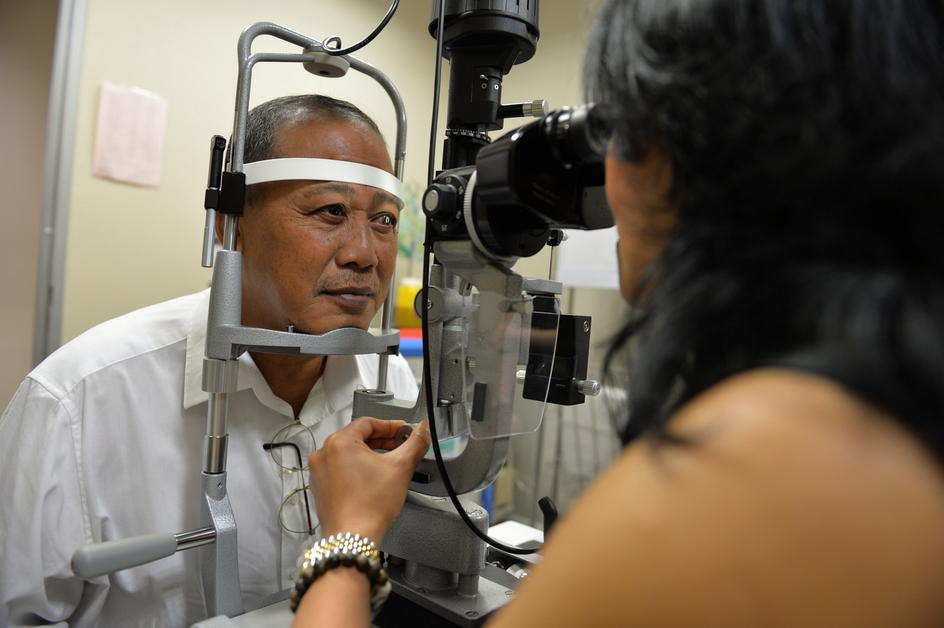Scientists find new genes linked to most prevalent glaucoma
Discovery may help identify new drug targets and in future, predict risk of getting disease
Sign up now: Get ST's newsletters delivered to your inbox

Associate Professor Tina Wong, senior consultant, Glaucoma Service, Singapore National Eye Centre, checking on her patient Mr Suwarsono Dargo who is suffering from glaucoma, a disease which could lead to blindness.
PHOTO: BERITA HARIAN
Researchers have found new genes associated with the most prevalent form of glaucoma in Singapore.
The finding could help identify new drug targets to treat glaucoma - dubbed the silent thief of sight, and in the future, predict one's risk of getting the disease.
Led by researchers from the Agency for Science, Technology and Research's Genome Institute of Singapore (GIS) and the Singapore Eye Research Institute (SERI), among others, the study screened more than 10,000 patients with primary- angle closure glaucoma.
It found five new genes associated with primary angle-closure glaucoma - a type of glaucoma which is responsible for a high proportion of blindness in Asia.
The patients came from 24 countries in Asia, Europe, Australia, North America and South America, and more than 1,500 were from Singapore.
The findings were published in May this year in the prestigious scientific journal Nature Genetics.
Professor Aung Tin, SERI's executive director and and head of the Singapore National Eye Centre's glaucoma department who co-led the study, said that the discovery of the new genes will help scientists learn about the pathways involved in disease development. Better treatments can then be developed.
"We are now looking into this question: If the genes can better predict risk of developing glaucoma, and how people at risk can be identified earlier," added Prof Aung, who is also the president of the World Glaucoma Association - an international organisation for glaucoma science.
Back in 2010, Prof Aung had found clusters of primary angle-closure glaucoma patients in families - a discovery which was rare for patients here.
This highlighted the possibility that glaucoma could be hereditary and spurred him to investigate the genetic basis of glaucoma.
The biggest cluster he found had multiple patients from the same family ranging two to three generations.
Glaucoma affects about 3 per cent of Singaporeans aged 50 and above, and accounts for 40 per cent of blindness here.
While the disease is preventable, most patients do not know they have it until it is too late. Glaucoma does not cause pain or dark spots in vision until an advanced stage.
In the case of acute primary angle-closure glaucoma, the eye's drainage system suddenly becomes blocked. This causes eye pressure to increase, leading to sudden blindness and acute eye pain.
The latest study adds on to previous findings in 2012 uncovered by the same group of researchers. Back then, researchers had found three genes linked to primary angle-closure glaucoma.
With the identification of the eight genes, patients can theoretically be screened for these genetic variants, said Dr Khor Chiea Chuen from GIS, who co-led the study with Prof Aung.
If a person carries all eight genes, for example, then he could be at much higher risk of glaucoma compared with other people with one or two genetic variants at most.
"This high risk group could perhaps be treated earlier to prevent the glaucoma and blindness from occurring. But more work is needed before this can be a reality," he added.
As the eye is a small, confined space, little abnormalities in the way cells behave, as a result of these genes, could make all the difference in the getting the disease, added Dr Khor.
"One of the five genes is also shared with Type 2 diabetes, another disease which happens very often and commonly in Singapore," he said.
"There long has been suspected that a link between diabetes and glaucoma exists. This study essentially puts more weight to this link."


